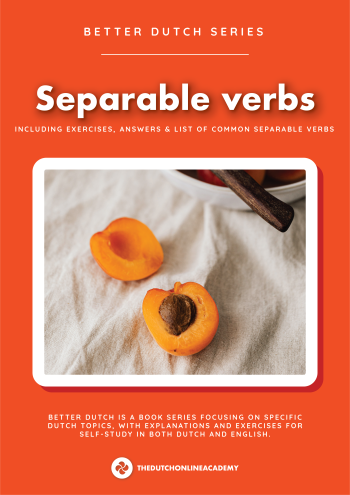Learn the theory
In this article you'll find more information about separable verbs. If you would like to practice more, take a look our PDF about separable verbs or the Word Order Video Course.
You have many separable verbs in Dutch.
- Opnemen
- Uitgaan
- Aankleden
- Overslaan
- Opstaan
- Afwassen
- Nadenken
- Inpakken
- Opvallen
These are just a few examples. There are many separable verbs. Let's look at how they behave in different types of sentences.
Separable verb in Dutch present tense
Sentence with one verb (the separable verb)
If a separable verb is the finite (conjugated) verb, the first part of the word comes at the end of the sentence.
- Ik neem de telefoon op.
- Wij gaan vanavond uit.
- Frits kleed zich aan.
- Jullie slaan drie opdrachten over.
- Hij staat altijd om zeven uur op.
- Mijn vader wast de borden af.
- Ze denkt even na.
- Ik pak het cadeautje in.
- Mijn gele jas valt erg op.
- Kijk je uit?
Sentence with two verbs
If the separable verb is not the finite (conjugated) verb, the verbs doesn't split and is usually placed at the end of the sentence.
- Ik moet de telefoon opnemen.
- Wij willen vanavond uitgaan.
- Frits moet zich aankleden.
- Jullie kunnen drie opdrachten overslaan.
- Hij moet altijd om zeven uur opstaan.
- Mijn vader zal de borden afwassen.
- Ze gaat even nadenken.
- Ik zal het cadeautje inpakken.
- Mijn gele jas zal erg opvallen.
- Zul je uitkijken?
Subordinate clause
If you don't know what a subordinate clause is, you could take a look at our article Dutch word order in a nutshell.
This is for many students the hardest scenario. If the separable verb is the only verb (it must be conjugated) it will move to the end of the sentence. It won't split.
- Ik zeg "hallo", als ik de telefoon opneem.
- Ik trek mijn nieuwe jurk aan, als we vanavond uitgaan.
- Frits zingt mee met de radio, terwijl hij zich aankleedt.
- Jullie zijn eerder klaar, omdat jullie drie opdrachten overslaan.
- Hij gaat vroeg naar bed, omdat hij altijd om 7 uur opstaat.
- Mijn moeder kijkt televisie, terwijl mijn vader de borden afwast.
- Ze zegt dat ze even nadenkt.
- Ik denk dat ik het cadeautje inpak.
- Jullie hebben me snel gevonden, omdat mijn gele jas erg opvalt.
- Ik wil weten of je uitkijkt.
Perfectum
If you are not familiar with the Dutch perfect tense yet or if you just want to practice a bit, you can take a look here.
In perfect tense, "ge" wil stand in between the separable parts. This works the same in regular and irregular verbs. Look:
- Ik heb de telefoon opgenomen.
- Wij zijn vanavond uitgeweest.
- Hij heeft zich aangekleed.
- Jullie hebben drie opdrachten overgeslagen.
- Hij is om 7 uur opgestaan.
- Mijn vader heeft de borden afgewassen.
- Zij heeft even nagedacht.
- Ik heb het cadeautje ingepakt.
- Heb je uitgekeken?
Imperfectum
The Dutch imperfectum with separable verbs looks like the present tense. Look:
- Ik nam de telefoon op.
- Wij gingen vanavond uit.
- Frits kleedde zich aan.
- Jullie sloegen drie opdrachten over.
- Hij stonden altijd om zeven uur op.
- Mijn vader waste de borden af.
- Ze dacht even na.
- Ik pakte het cadeautje in.
- Mijn gele jas viel erg op.
- Keek je uit?
Be aware: Words starting with ver-, be-, her- , ont-, ge- are not separable.
Examples: vergeten, begrijpen, herhalen, onthouden, gebruiken.
Wat to practice your word order? Check out our Word Order Course!
Practice with exercises
Do you know how to split the separable verbs? Let's practice!
comments
Login to leave a comment


![Learn Dutch with The double infinitive in Dutch [list of auxiliary verbs included]](https://images.ctfassets.net/f8l4gy5qxe00/7fpaN2iBE3h1xS7LRL8c0h/3bbebedc080cbf7eece73424c8e3918f/The_double_infinitive.png?w=350&h=495&q=50&fm=png)
